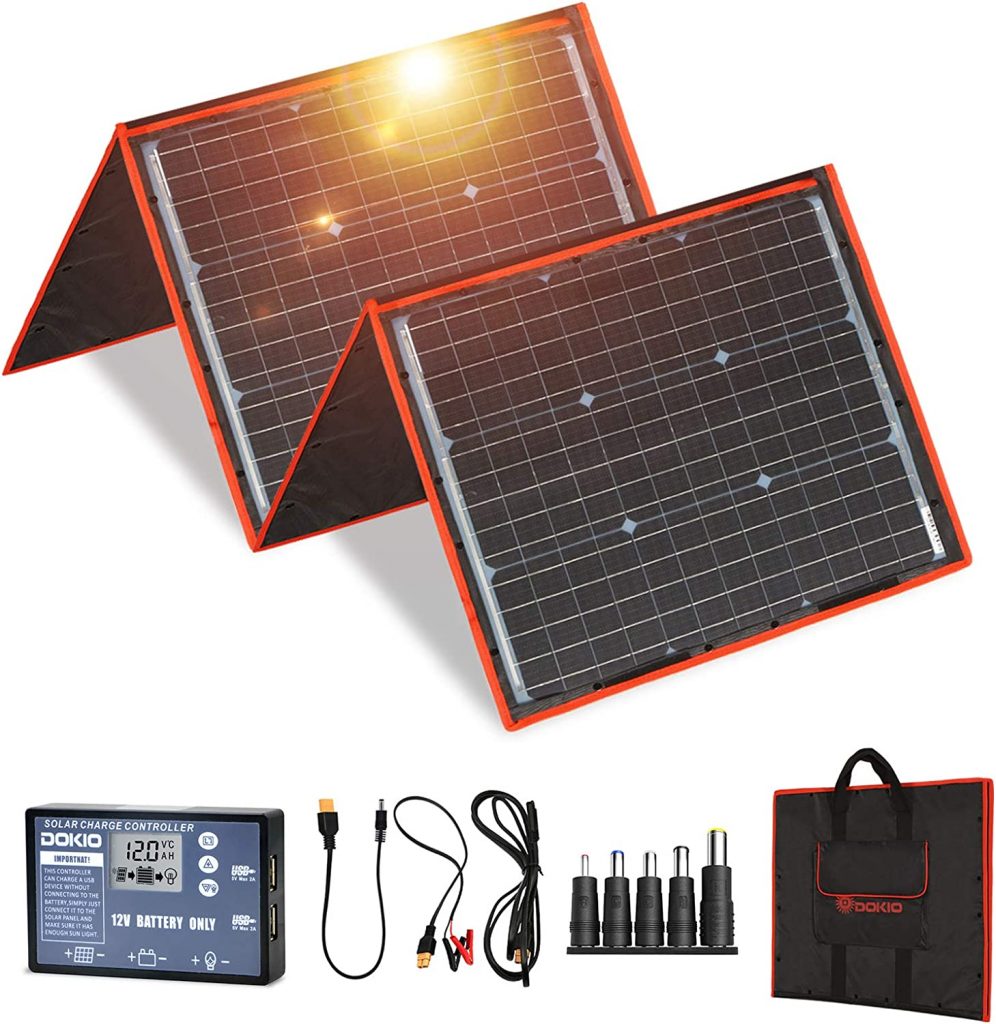Table of Contents
ToggleSolar panel kits are increasingly popular with homeowners and businesses looking to generate electricity from the sun. These kits come in various sizes and configurations. They offer the convenience of having all the necessary components in one package.
But are solar panel kits worth it? Let’s find out.
What are solar panel kits?
Solar panel kits are packages that contain components needed to build a solar energy system. These kits usually consist of solar panels, mounting hardware, cables, and the necessary electrical components for connecting the panels to a charge controller or inverter.
Some kits may also include a frame and mounting hardware for installing solar panels onto a roof or other solid surface. These kits are useful for newbies who want to explore solar energy for their homes or outdoor garage and recreational activities like camping and fishing.


Source: Freepik
Types of options within solar panel kits
There are several types of solar panel kits in the market. Some are cheaper; others are easy to carry around. Let’s explore them and see which is the most suitable kit for you.
Cheap solar panel kits
These kits make the switch to solar energy affordable. They have all the components necessary to build a basic solar energy system, including solar panels, mounting hardware, and wiring. They are easy to install and require minimal maintenance.
Portable solar panel kits
They are an easy and convenient way to generate electricity on-the-go to power batteries, electrical appliances and lights. The panels come in various sizes and wattages and can be easily transported, making them perfect for camping, or any other off-grid activity, such as social gatherings and picnics.
Solar panel house kits
They are designed to supply an entire home with solar power. While they may come with a higher price tag, they provide everything you need to harness the sun’s energy for your home, including photovoltaic panels, mounting brackets, wiring and inverters.
Among other accessories, they also include batteries to store the energy produced and a charge controller to regulate the energy. Plus, they come with clear instructions for a successful setup. So homeowners can install them on their own without having to hire a professional.
DIY solar panel kits
They include all the necessary components, detailed instructions, and a user manual on how to assemble the panel, as well as safety precautions and maintenance tips for installing the system yourself and saving on installation costs.
What are the components of solar panel kits?
Let’s delve into the various components that make up a solar panel kit and how to determine the right capacity and features to suit your needs. Additionally, understanding the components that make up a solar panel system helps ensure proper installation and maintenance.
Solar panel
These are the main components of a solar panel kit. The panels can be either monocrystalline or polycrystalline, and they are responsible for converting sunlight into electrical energy.
Inverter
The inverter converts the DC electricity produced by the solar panels into AC electricity. It is an essential part of any solar panel system, as it allows solar energy to be used in the most efficient way possible.
Mounting hardware
It includes brackets, bolts, and other components used to install solar panels on your roof or ground securely. The type of mounting hardware needed will depend on the type of roof or ground you have and the size and weight of the solar panels.
Battery storage system
It captures excess energy produced by the panels to provide power when the panel is not receiving enough sunlight or during power outages.
Wiring and cables
These connect the solar panels to the inverter and battery storage system. It is essential to use the correct gauge and type of wiring and cables to ensure the system is safe and efficient.
Electric metre
It monitors your energy usage and electricity production to track the performance of your solar panels.
It is essential to carefully review the components included in a solar panel kit before purchasing to ensure you get everything you need for your specific energy needs.
How much do solar panel kits cost?
Solar panel kit costs vary depending on size, quality of components, and installation location. For example, a small kit may cost around $500, while a larger kit for a home could cost upwards of $10,000 or more.
Factors that can affect the price include the number of solar panels in the kit, the efficiency of the panels, and the type of inverter and mounting hardware included. Therefore, it’s essential to carefully research and compare different solar panel kits to find the best value for your money.
What to consider before installing solar kits?
When considering installing a solar kit, here are some of the primary considerations to make before making a purchase:
Local climate
Different climates require different types of solar systems. For example, if you live in cooler weather, you will need a more efficient system to capture and store more energy. Additionally, solar panels require direct sunlight to work, so consider the amount of sunlight your area receives.
Roof or ground size
Consider the size and orientation of your roof or ground to ensure you have enough space for the solar panels and that they will be positioned to maximise sunlight exposure.
Budget
Calculate how much you want to spend on a solar panel kit and consider any financing options available. Don’t settle for the first solar kit you come across. Research different brands and models to make sure you get the best deal.
Local regulations and incentives
Before installing a solar system, understand the available local regulations and incentive programs. You may be eligible for tax credits or other incentives to help offset your system’s cost.
Warranty and maintenance
Consider the warranty and maintenance requirements for the solar panel kit to ensure you are covered, including the type of coverage included and the duration of the coverage offered in case you face any challenges.
Are DIY solar kits worth it?


Source: Kindel Media on Pexels
DIY solar kits can be a good option for homeowners or businesses who have the time and resources to install the panels themselves. This can save installation costs and provide a sense of accomplishment and independence.
However, it is important to read and follow the instructions provided with the kit carefully. Otherwise, the energy may not be transmitted properly, and the panels may be unable to function at full capacity.
Pros and Cons of Solar Panel Kits
When evaluating the value of solar panel kits, it’s important to consider both the potential benefits and drawbacks.
Pros
Some of the advantages of solar panel kits include the following:
Cost savings
Solar panel kits can save you money on your energy bills, as you will be generating your electricity rather than purchasing it from a utility company.
Environmental benefits
Solar kits produce clean, renewable energy, which helps to reduce greenhouse gas emissions & combat climate change.
Independence
It offers you the freedom to generate electricity, which can be especially useful in areas with unreliable or expensive grids of solar power kits. With the right tools and instructions, you can install the panels yourself, saving on labour costs and gaining a sense of accomplishment.
Off-grid experience
It is a great option for outdoor use, as it can provide energy for sheds, garages, or other outbuildings without the need for a traditional power source.
Cons
However, there are also some cons to solar panel kits, including:
Initial cost
The kits can be expensive to purchase and install, although the cost has decreased in recent years.
Maintenance
Solar panel kits require maintenance, such as cleaning the panels and checking for damage.
Limited production
Solar panels can only produce electricity when the sun is shining, so you will still need to rely on the grid or a backup power source during cloudy or nighttime periods.
Concluding remark
In conclusion, solar panel kits can be an excellent option for those looking to switch to solar energy as a sustainable way to conserve energy. In addition, it can reduce your electricity bills or make you more self-sufficient in terms of energy. However, the upfront costs can be expensive, and there are some additional costs associated with installation and maintenance that should be taken into consideration before making a purchase.
For more information and guidance on solar panel kits, check out Just Solar. It has all the insights you need, from choosing the right kit to tips on maintaining and maximising your solar energy system.





